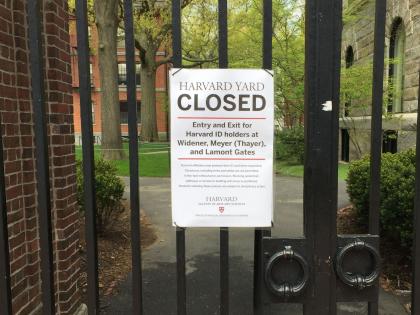During the April 2 disclosure that the e-mail accounts of a resident dean were investigated multiple times in connection with an Administrative Board review of students’ academic misconduct (see “E-mail Imbroglio,” May-June, page 46), President Drew Faust told the Faculty of Arts and Sciences (FAS) that the University appeared to have “highly inadequate” policies and processes in place for treating electronic communications properly.
She therefore retained attorney Michael B. Keating, LL.B. ’65, to review the facts and report on whether the situation is fully understood; The Harvard Crimson subsequently disclosed that his report will be delivered to a committee comprising Faust and Corporation members Lawrence S. Bacow, William F. Lee, and Theodore V. Wells Jr. According to a statement issued by Lee:
In addition to discussing his findings with the Corporation committee, [Mr. Keating] will prepare a written report, with appropriate regard for confidentiality, that will be shared with the Harvard community. He aims to finish his work by June 30.
Separately, Faust set up a University task force to establish policies and guidelines on e-mail privacy, chaired by Green professor of public law David J. Barron. That group began meeting on May 6; it expects to make recommendations for Corporation action by the end of the coming fall term. It operates under this charter from Faust:
The task force will consider and recommend appropriate policies regarding access to, and confidentiality of, electronic communications that rely on university information systems. It will consult with faculty, staff, and students in order to obtain a full understanding of the perspectives of each group.
In undertaking its work, the task force will inform itself about policies now in place at Harvard and other relevant institutions and solicit perspectives and advice on best practices.
The task force will consider whether and to what extent Harvard’s policies should be University-wide or specific to certain parts of the University or particular institutional roles and responsibilities.
The task force will be expected to focus on recommending policies for the future that are both principled and practicable and that account for the reasonable expectations of individuals, the legitimate interests of the University, and associated issues of notice and process.…
Barron’s task force includes administrative, associate, and executive deans from the schools of divinity, public health, and medicine, and a dozen professors from diverse faculties (the complete list appears at www.harvardmag.com/privacy-13). It will be supported by vice presidents Marilyn Hausammann (human resources), Robert Iuliano (University general counsel), Anne Margulies (chief information officer), and Leah Rosovsky (strategy and programs).








